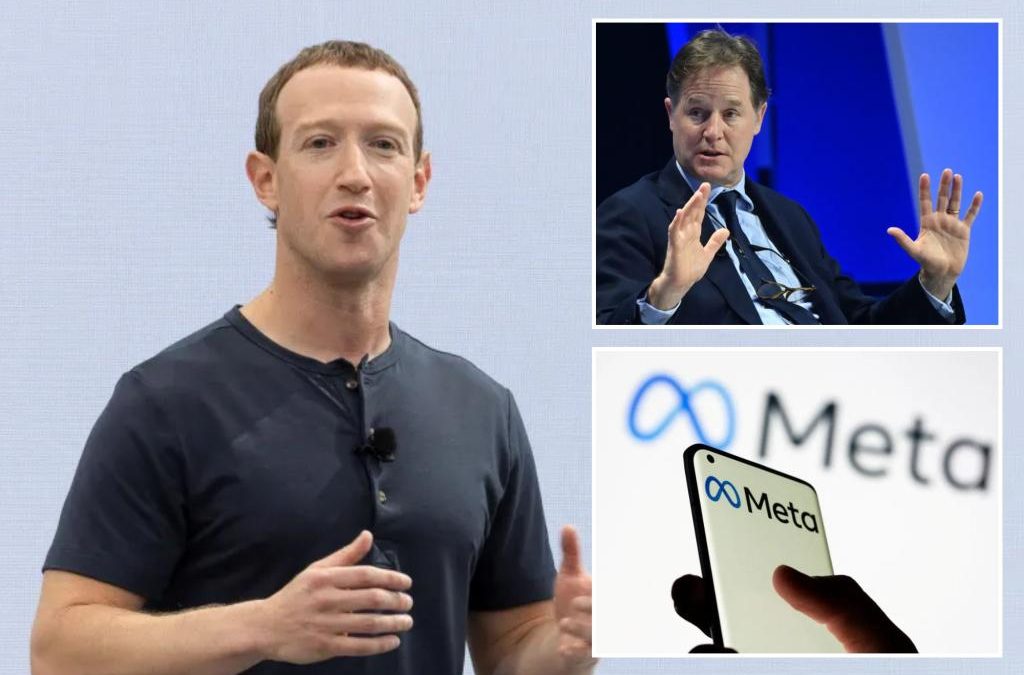Meta chief Mark Zuckerberg turned down requests from his top brass back in August 2021 to expand the company’s child safety and well-being workforce, documents and emails released by Congress revealed.
Nick Clegg, the vice president of global affairs at then-Facebook — rebranded to Meta later that year — urged Zuckerberg in an email to hire 45 more employees focused on preventing bullying, harassment, and self-harm, according to Bloomberg.
“From a policy perspective, this work has become increasingly urgent over recent months,” Clegg wrote. “Politicians in the US, UK, EU and Australia are publicly and privately expressing concerns about the impact of our products on young people’s mental health.”
Other Meta executives, including senior product executive Naomi Gleit, Chief Product Officer Chris Cox and Chief Operating Officer Sheryl Sandberg — who left the tech giant’s board of directors earlier this month after a 12-year stint — endorsed Clegg’s request to expand the company’s child-safety and well-being teams, according to the emails obtained by Bloomberg.
The message was among the internal communications at Meta released by the Senate Judiciary Committee in advance of a hearing Wednesday — when Zuckerberg and fellow chief executives of X, TikTok, Snap, and Discord will testify on online child sexual exploitation and the impact of social media on children before the committee.
Clegg’s August 2021 request was shot down, Bloomberg reported.
A subsequent email Clegg sent Zuckerberg in November 2021 asked for a smaller number of new hires, and acknowledged that his original proposal “was not funded.”
Congress didn’t release any emails from Zuckerberg to Clegg, according to Bloomberg.
In the time it took Clegg to revise his headcount proposal, The Wall Street Journal published a bombshell investigation that included a swath of internal documents — which became known as the “Facebook Files” — leaked by whistleblower and former Facebook data engineer Frances Haugen.
The 248 pages of once-confidential files released in October 2021 showed that Meta was aware of the harmful effects of its network of social media sites on young users, including teenage girls who used the uber-popular Instagram app.
Clegg seemingly referenced reports about the Facebook Files in his messages to Zuckerberg, according to Bloomberg, noting that the topic of user safety was becoming increasingly urgent for Meta to address.
“This work & narrative has of course become a more critical focal point for policymakers, regulators, et al in recent weeks — this is not likely to diminish going forward,” he said.
“I am supportive of this and will follow up,” Sandberg wrote in response to Clegg, per the documents released by Congress. “As you know, we have overall budgeting issues across the board so no promise on what will happen.”
It wasn’t immediately clear if Meta ended up hiring people in response to Clegg’s November 2021 request, according to Bloomberg, though Meta reportedly added more than 13,000 new jobs that year.
A spokesperson for Meta told to The Post that “these cherry-picked documents do not provide the full context of how the company operates or what decisions were made.”
“We have a robust central team overseeing youth well-being efforts across the company and have built technology and teams that can move quickly and efficiently to implement new improvements across specific apps,” the spokesperson added, noting that the company has “over 30 tools, resources and features and we have protections to help keep teens safe and away from potentially harmful content or unwanted contact.”
According to Zuckerberg’s prepared testimony for his Wednesday Congress appearance, Meta has some 40,000 people currently working on safety and security and has spent more than $20 billion on those efforts since 2016.
However, in recent months, the company has faced multiple lawsuits about its child-safety practices, including one filed earlier this month that said Meta “solicited” an Apple executive’s 12-year-old daughter on Instagram.
The allegation is part of a sweeping civil lawsuit filed in December by New Mexico Attorney General Raul Torrez, who alleges underage Facebook and Instagram users are exposed to potential contact with sex predators and bombarded with adult sex content on the apps.
Source




